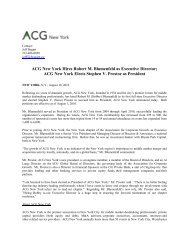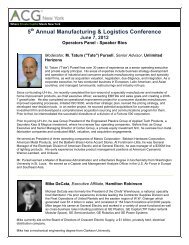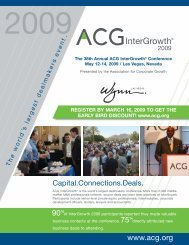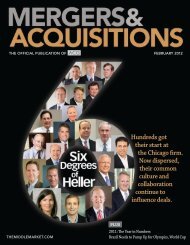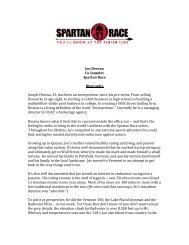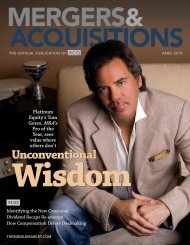Not one to mince words, KPS Capital's Michael Psaros offers a ...
Not one to mince words, KPS Capital's Michael Psaros offers a ...
Not one to mince words, KPS Capital's Michael Psaros offers a ...
- No tags were found...
Create successful ePaper yourself
Turn your PDF publications into a flip-book with our unique Google optimized e-Paper software.
06-08,78-85_ACG.qxd 4/6/09 5:11 PM Page 80COMMUNITY COMMENTARYMaximizing Value through IPFailure <strong>to</strong> register a company’s trademarks or intellectual property cancost a business in the event of a sale.By Denise Walsh and Robert ShepherdWhen starting a business, most entrepreneursthink about financingthe company, hiring employees andmarketing the business <strong>to</strong> potential cus<strong>to</strong>mersand clients. The last thing executives may thinkabout is the sale of the business. However, mostinvestment bankers advise owners <strong>to</strong> startpreparing for a sale from day <strong>one</strong>. This meansthat, from the date of its formation, the ventureshould be organized so that a future buyer couldstep in at anytime and seamlessly take over operations.One fairly inexpensive method of preparingfor sale at the outset of a business is <strong>to</strong>register the company’s intellectual propertywith the United States Patent and TrademarkOffice (“USPTO”). Registration with the USPTOhelps ensure that the purchase price a businessowner receives upon sale includes thevalue of the company’s goodwill. Some key elementsof goodwill are the company’s name,trademark and/or service mark. For example,the name and symbol of a fast-food chain, aswell as the name of its signature hamburger,may be some of the most valuable assets ofthe business.Failure <strong>to</strong> register an entity’smark may result in aholdback or even a reductionof the purchase price.We recently represented abusiness owner who sold his company aftertwenty years of operation. The seller failed <strong>to</strong>register the company’s mark with the USPTO.Due <strong>to</strong> the premium being paid for the goodwillof the business, the buyer ran a trademarksearch. The results of the trademark search revealedthat, unbeknownst <strong>to</strong> the seller, a thirdparty had filed a trademark application with theUSPTO for a very similar mark. Although thecompany attained certain common law rights <strong>to</strong>the mark as a result of its use and likely wouldprevail in litigation against the third party, thebuyer was understandably apprehensive. Atclosing, the buyer required that a portion of thepurchase price be placed in escrow pendingresolution of the matter. Any legal fees incurredby the buyer in connectionwith such resolution were<strong>to</strong> be reimbursed out ofthe escrowed funds andthe remaining funds, ifany, were <strong>to</strong> be paid <strong>to</strong> theseller.In another recent example,a business ownersold her business <strong>to</strong> a foreignbuyer. Once again,the seller failed <strong>to</strong> registerthe company’s mark.The company had used themark since inception and,therefore, attained certaincommon law rights <strong>to</strong> the Denise Walsh“Failure <strong>to</strong> register an entity’s mark mayresult in a holdback or even a reduction ofthe purchase price.“mark. The seller knew of no third-party claims <strong>to</strong>the contrary. <strong>Not</strong>withstanding, the buyer requireda reduction in the purchase price due <strong>to</strong>the seller’s failure <strong>to</strong> register the company’smark. In many foreign countries, a person doesnot have any rights in a mark unless he or sheregisters the mark with the appropriate authorities.The buyer was unfamiliar with the protectionsafforded by the common law and was,therefore, uncomfortable with the fact that thebusiness it was buying had not registered itsmark. The buyer also wanted <strong>to</strong> register the markin its own country and non-registration in theUnited States presented an obstacle <strong>to</strong> such foreignregistration. From the buyer’s perspective,the company was worth less absent federal registration.The two scenarios describedabove could havebeen avoided if the businessowners registeredthe marks of their respectivecompanies from theoutset of the business.Once a company registersits mark as a federaltrademark, the companyhas nationwide rights inthat mark as relates <strong>to</strong>the particular goods orservices for which themark is used. From thedate of registration, thirdparties are placed on constructivenotice of the registrant’s claim of ownershipof the mark. The registering entity cankeep others from using the same mark, as wellas any “confusingly similar” mark, throughoutthe United States. In other <strong>words</strong>, an entity onthe East Coast of the United States can s<strong>to</strong>pan entity on the West Coast from using an identicalor similar mark. This represents a significantexpansion of a company’s common lawrights, which extend only <strong>to</strong> the geographicarea in which the entity sells its products orservices.Some additional benefits that flow from fed-80 ACG > MERGERS & ACQUISITIONS February 2009



